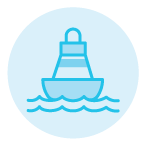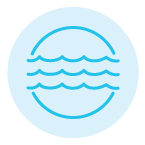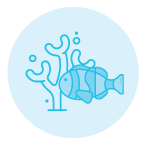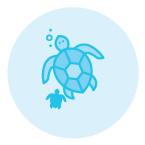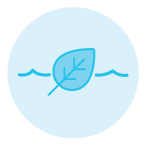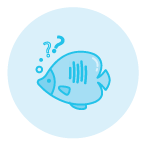Conservation. Training. Community.
Extended Horizons is proud to be offering multiple conservation course related options, which include our Conservation Course Training Dives, community work-day dives, and our more casual EcoDives.
As a PADI 5-Star and Green Star Facility, our Maui scuba diver training & education program offers the following Conservation Course trainings, each with itʻs own Specialty Diver Certification, or you can get a sample of each specialty by incorporating one or more of these as part of your Advanced Open Water Scuba Certification Course Adventure Dives.
In these courses, you will learn how to make the most of each Maui scuba dive by collecting data as a citizen scientist. That data will by used by the scientific community and policy makers to track the impact humans have on the oceans and create and implement new policies to help preserve and protect our oceans (e.g., ban on plastic bags, doing away with plastic straws, fishing restrictions). We offer Maui scuba dives that include collecting debris off of the seafloor, counting fish, and monitoring coral health.
-
Peak Performance Buoyancy (2 Dives)
Excellent buoyancy control is what defines skilled scuba divers. Learn to glide effortlessly through the water, use less air, and ascend, descend, or hover almost naturally. Peak buoyancy also makes it easier to observe aquatic life without disturbing their surroundings. Do you want to master your buoyancy? Take the PADI Peak Performance Buoyancy Specialty course, which improves the buoyancy skills you learned as a new diver and elevates your diving to the next level.
-
Coral Reef Conservation (1 Dive)
The Coral Reef Conservation Specialty teaches divers (and snorkelers) the importance of coral reef habitats and how to help conserve these vital ecosystems. You will learn how coral reefs function, why coral reefs are important, the causes of their decline, and how to help preserve this precious ecosystem. You will also learn to collect and report data on the health of corals as a citizen scientist, which not only helps scientists learn more about the health and status of coral reefs, but also helps to influence policy changes.
-
Dive Against Debris (1 Dive)
Divers who earn the Dive Against Debris Specialty distinguish themselves as caretakers for the underwater world. The Project AWARE® Dive Against Debris Distinctive Specialty course explains how to conduct a debris survey while fun diving, teaches you to sort, weigh, report, and dispose of marine debris, counts towards the prestigious PADI Master SCUBA Diver Rating, and enables you to be part of a global movement for change.
-
Reef Check EcoDiver (Coming Soon)
You will learn how to easily conduct fish, invertebrate, and/or coral surveys which will provide valuable and important information to researchers and resource managers around the world, while still enjoying your dive experience. Then we will show you how easy it is to input the data collected to be used by scientists and other officials to understand how marine ecosystems change over time.
-
Sea Turtle Awareness (2 Dives)
The ProjectAWARE Sea Turtle Awareness Distinctive Specialty teaches divers (and snorkelers) techniques to identify turtles, how to properly record observations, responsible practices when observing sea turtles, and how to promote sea turtle conservation, all while exploring the underwater world along the west coast of Maui.
-
Shark Conservation Awareness (2 Dives)
The ProjectAWARE Shark Conservation Awareness specialty will teach you about shark conservation issues. The dives will focus on how to assess dive locations for potential hazards and for features that may reduce impacts on sharks both underwater and at the surface. You will also learn to identify observed shark species, identify non-natural injuries to sharks observed (e.g. fishing hooks or lures, fishing line wrapped around their body), identify if sharks are feeding, resting, cruising, or laying on the seafloor, all while exploring the underwater world along the west coast of Maui.
-
Underwater Naturalist (2 Dives)
Get a better understanding of the local ecosystem and the differences between terrestrial and aquatic worlds. Learn more about symbioses, underwater ecology, and aquatic plant and animal habitats. You will learn to identify behaviors and see creatures you may have previously missed. Take the PADI Underwater Naturalist Specialty course and you’ll see new things, even on the most familiar Maui scuba dive sites.
-
Fish Identification (2 Dives)
“What was that fish?” is a common question heard after a dive. If you want to be the scuba diver with the answers, instead of the one asking the questions, then take the Fish Identification Specialty course. You will enjoy your dives even more when you recognize the creatures that you see and can identify the main fish families and their characteristics.
Too Many Options?
It can be overwhelming to plan these important aspects of your vacation.
Give us a call. We can help. And we’re friendly to talk to!
Looking for an easy way to bundle a conservation course into 2 days of diving?
The Advanced Open Water Course is a cost-effective way to do just that! Beyond the required Deep and Navigation dives, some of our favorite ways to incorporate Conservation Courses into the Advanced Open Water Course:
Option One:
Advanced Open Water with Ecology focus
• Deep Diver (Required)
• Navigation Diver (Required)
• Peak Performance Buoyancy (Step one to being an EcoDiver)ʻ
• Dive Against Debris (First steps towards becoming a citizen science diver)
• Underwater Naturalist
Option Two:
Advanced Open Water with Marine Life focus
• Deep Diver (Required)
• Navigation Diver (Required)
• Peak Performance Buoyancy (Step one to being an EcoDiver)ʻ
• Dive Against Debris (First steps towards becoming a citizen science diver)
• Fish Identification Diver
If you donʻt have the time or inclination to go for a Specialty Certification, we also offer EcoDives which are guided tours with an emphasis on various conservation topics. Learn More about EcoDiving.
Be sure to check out our Special Events page to see if any of our Conservation Events are happening while youʻre visiting!
